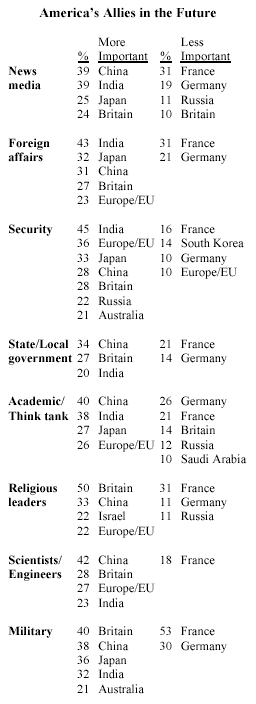 Looking into the future, many opinion leaders see China and India, with their huge populations and rapidly expanding economies, as increasingly important partners for the U.S. Pluralities in four of the eight opinion leader groups identify China as a country that will be more important to the U.S. in the future, while pluralities in another three groups name India. The United Kingdom, traditionally a strong U.S. ally, is the most commonly mentioned country among religious and military leaders. Many influentials also mention Japan, the EU, and Russia as countries that will become more important to the U.S.
Looking into the future, many opinion leaders see China and India, with their huge populations and rapidly expanding economies, as increasingly important partners for the U.S. Pluralities in four of the eight opinion leader groups identify China as a country that will be more important to the U.S. in the future, while pluralities in another three groups name India. The United Kingdom, traditionally a strong U.S. ally, is the most commonly mentioned country among religious and military leaders. Many influentials also mention Japan, the EU, and Russia as countries that will become more important to the U.S.
France, on the other hand, is widely named as a country that will be less important to the U.S. in the years to come. A majority of military leaders see this as an alliance in decline, as do roughly three-in-ten media, foreign affairs and religious leaders. Many also believe Germany will be less relevant to the U.S, particularly those with military backgrounds and from think tanks and the academy. In addition to these two traditional western European allies, Russia, the EU, Great Britain, and Saudi Arabia are also mentioned with some frequency as less important U.S. allies in the future.
Strong EU Good for the U.S.
Despite the growing importance of Asia, and tensions in recent years between the U.S. and many European allies over the Iraq war and other issues, both opinion leaders and the public strongly believe that the U.S. and Western Europe should maintain a close relationship. Fully 84% of the public and over 78% in each group of opinion leaders say it is important for the U.S.-Western Europe partnership to be as close as it has been in the past.
Moreover, there is a solid consensus among influentials that a stronger EU is a good thing for the U.S. In each of the eight groups, at least 60% say a stronger EU would be good for the U.S., while no more than 11% believe this would be a bad thing. The public is slightly less enthusiastic about a strong EU; still, 47% believe this would be a good thing, while 28% say it would not matter and only 12% say it would be bad for the U.S.
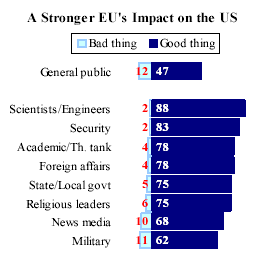 One-third of the public has a favorable opinion of the EU, while just over a quarter (27%) hold an unfavorable view. Opinions about the EU have grown slightly less positive since February 2004, when 39% had a favorable view and 26% an unfavorable one. Certain segments of the American public are particularly likely to have a positive outlook toward Europe. Those with higher incomes, the college educated, white men, and Democrats — especially liberal Democrats — give the EU high favorability ratings and are particularly likely to back a strong EU.
One-third of the public has a favorable opinion of the EU, while just over a quarter (27%) hold an unfavorable view. Opinions about the EU have grown slightly less positive since February 2004, when 39% had a favorable view and 26% an unfavorable one. Certain segments of the American public are particularly likely to have a positive outlook toward Europe. Those with higher incomes, the college educated, white men, and Democrats — especially liberal Democrats — give the EU high favorability ratings and are particularly likely to back a strong EU.
Many Americans, however, are unfamiliar with the EU, as a plurality currently say they have either never heard of it (14%) or do not know enough about it to offer an opinion (26%). Pew surveys have generally found that Americans pay relatively little attention to European affairs; for instance, only 16% followed the recent German elections very or fairly closely, and similarly low numbers followed the 2002 French elections (19%) and the 2001 Labour Party victory in Great Britain (15%).
Public Approval of the U.N. Declines
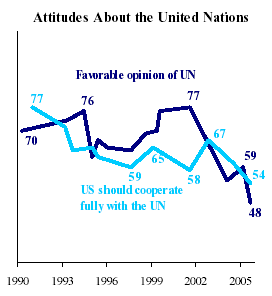 The public’s view of the United Nations has soured since March, continuing a slide that has been relatively steady over the last few years. In March, 59% held a favorable opinion of the U.N.; today just under half (48%) have a positive view. The decline has been steepest among groups that had been some of the U.N.’s strongest supporters, including Democrats (now at 58% favorable, down 17 points since March), blacks (49%, down 20 points), and those with household incomes below $20,000 (48%, down 19 points).
The public’s view of the United Nations has soured since March, continuing a slide that has been relatively steady over the last few years. In March, 59% held a favorable opinion of the U.N.; today just under half (48%) have a positive view. The decline has been steepest among groups that had been some of the U.N.’s strongest supporters, including Democrats (now at 58% favorable, down 17 points since March), blacks (49%, down 20 points), and those with household incomes below $20,000 (48%, down 19 points).
Enthusiasm for U.S.-U.N. cooperation is also waning. An early October Pew survey found that slightly more than half (54%) of the public agrees with the statement “the United States should cooperate fully with the United Nations,” down six points from August. Meanwhile, the percentage disagreeing has risen from 30% to 39%.
The importance Americans attach to strengthening the U.N. has also slipped. Four-in-ten say a stronger U.N. should be a top long-range priority for U.S. foreign policy, down from 48% in July 2004. Opinion leaders also tend to regard strengthening the U.N. as a second tier goal, although there is some variation among groups. For example, 54% of scientists and engineers consider this a top priority, compared with only 14% of security experts.
Opinions about the U.N. break sharply along partisan lines. Among the general public, Democrats have a more favorable view of the institution, are more likely to believe the U.S. should cooperate with the U.N., and place a higher priority on strengthening the U.N. Meanwhile, Republicans are the least enthusiastic about the U.N., with independents occupying a middle ground.
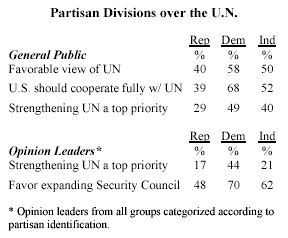 Among influentials, Democrats are considerably more likely than Republicans or independents to rate strengthening the U.N. as a top priority. There are also significant partisan divisions among influentials on the issue of expanding the U.N. Security Council, with 70% of Democrats and 62% of independents favoring a larger Council, compared to 48% of Republicans. Overall, majorities of seven opinion leader groups support enlarging the Security Council, with state and local government leaders the only exception (39% favor, 48% oppose).
Among influentials, Democrats are considerably more likely than Republicans or independents to rate strengthening the U.N. as a top priority. There are also significant partisan divisions among influentials on the issue of expanding the U.N. Security Council, with 70% of Democrats and 62% of independents favoring a larger Council, compared to 48% of Republicans. Overall, majorities of seven opinion leader groups support enlarging the Security Council, with state and local government leaders the only exception (39% favor, 48% oppose).
Even larger partisan differences emerge over another international institution, the International Criminal Court (ICC). Roughly nine-in-ten (88%) Democratic opinion leaders say the U.S. should join the ICC, compared with 62% of independents and just 33% of Republican influentials. There is also a great deal of variation among the eight groups over this issue, with scientists and engineers (83% favor) and foreign affairs (81% favor) the most supportive, and military (45%) and state and local government leaders (45%) the least supportive.
Influentials, Public Differ Over Trade
Consistently, opinion leaders are more likely to embrace free trade than the general public. Just 44% of the public believes that NAFTA has been a good thing for the U.S., while 34% say it has been a bad thing; these views have been relatively consistent across time (in December 2004, 47% said “good thing” and 34% “bad thing”). Opinions on NAFTA are also fairly consistent across demographic and political categories, with the exception of age — those under 50 (51% good, 29% bad) have a much more favorable opinion of trade agreements than do those over 50 (34% good, 41% bad).
Seven of the opinion leader groups think NAFTA has been a good thing for the U.S. Only religious leaders mirror the mixed feelings of the public. This enthusiasm for free trade extends to CAFTA, the recently passed Central American Free Trade Agreement. Solid majorities of every group except religious leaders favor CAFTA (a 44% plurality of religious leaders support the treaty). Interestingly, the sharp partisan divisions that exist on many other issues are largely muted on trade — 83% of Republican opinion leaders think NAFTA has been good for the U.S., compared with 73% of Democrats and 74% of independents; 84% of GOP leaders approve of CAFTA, compared with 69% of Democrats and 73% of independents.
Another reflection of the gap between influentials and the public on trade can be seen in the relative importance each places on the protection of American jobs. The public rates this as nearly as important as defending the country against terrorism (86% terrorism, 84% jobs). In contrast, few opinion leaders consider jobs a top-tier foreign policy concern. In only two groups, state and local government leaders (64%) and religious leaders (55%), do majorities rate this as a top priority.
Public Divided over Use of Nuclear Weapons
 By a 70% to 24% margin, the American public widely supports the idea of the U.S. signing a treaty with other nations to reduce and eventually eliminate all nuclear weapons, including our own. This receives majority support from Republicans (63%) as well as Democrats (77%) and independents (73%). (This question was not asked of opinion leaders).
By a 70% to 24% margin, the American public widely supports the idea of the U.S. signing a treaty with other nations to reduce and eventually eliminate all nuclear weapons, including our own. This receives majority support from Republicans (63%) as well as Democrats (77%) and independents (73%). (This question was not asked of opinion leaders).
Despite this general support for multilateral disarmament, many Americans remain willing to use nuclear weapons preemptively if America or one of its allies were faced with a serious threat. Just under half (46%) say the U.S. would be justified in using nuclear weapons first if another nation seriously threatened to use nuclear weapons against us, and nearly as many (41%) say this would also be justified if that serious threat were against a U.S. ally.
The likelihood of nuclear weapons being used against the U.S. or its allies is a real one to some Americans. Nearly a quarter say that within the next few years America is very likely (8%) or fairly likely (16%) to be the target of a nuclear attack. Even more see the possibility of an attack against one or more of America’s allies as very (14%) or fairly (26%) likely.
Public Perceptions of Nuclear States
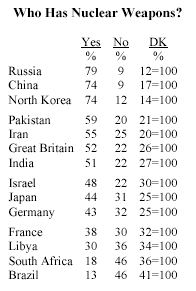 Large majorities of the public believe that Russia (79%), China (74%), and North Korea (74%) possess nuclear weapons. But more than half (55%) also believe Iran currently has nuclear weapons. This is comparable to the percentage saying that Pakistan, India and Great Britain have nuclear weapons capabilities.
Large majorities of the public believe that Russia (79%), China (74%), and North Korea (74%) possess nuclear weapons. But more than half (55%) also believe Iran currently has nuclear weapons. This is comparable to the percentage saying that Pakistan, India and Great Britain have nuclear weapons capabilities.
By a 48% to 22% margin, more say Israel does have nuclear weapons than say it does not. Fewer than half list Japan (44%), Germany (43%), and France (38%) as members of the nuclear club. At the other end of the spectrum, fewer than one-in-five believe that South Africa and Brazil are in possession of nuclear weapons.
While many Americans believe such countries as North Korea, Iran and Libya have developed nuclear capabilities, those who hold this view are no more likely to say that America would be justified in using nuclear weapons preemptively if attacked.
Knowledge of Foreign Affairs
 In addition to measuring public attitudes about America’s place in the world, the survey also gauged basic public knowledge about international political issues. For example, when asked what issue has been the focus of international talks with North Korea, 57% correctly identified nuclear weapons. Other questions were less widely known. Just under half (46%) could named Israel as the country that recently ceded control of the Gaza Strip to the Palestinians, and 37% could recall Vladimir Putin as the name of Russia’s president. Overall, 28% answered all three questions correctly, while 38% could answer one or two of the questions correctly, and 34% got none of the questions right.
In addition to measuring public attitudes about America’s place in the world, the survey also gauged basic public knowledge about international political issues. For example, when asked what issue has been the focus of international talks with North Korea, 57% correctly identified nuclear weapons. Other questions were less widely known. Just under half (46%) could named Israel as the country that recently ceded control of the Gaza Strip to the Palestinians, and 37% could recall Vladimir Putin as the name of Russia’s president. Overall, 28% answered all three questions correctly, while 38% could answer one or two of the questions correctly, and 34% got none of the questions right.
Informed Public Views World Differently
In general, those who are most knowledgeable about international affairs (those who answered all three of these questions correctly) express a somewhat more internationalist perspective on world affairs. By contrast, people who have relatively little knowledge about these issues (those who answered none of the questions correctly) see the world as a more threatening place, and place more emphasis on taking care of America first.
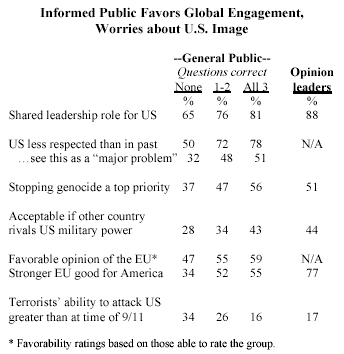 When asked to characterize what role the U.S. should play in world affairs, 81% of those in the high-knowledge group favor a shared leadership role. Fewer low-knowledge Americans agree (65%). The generally multilateral outlook of those who are most knowledgeable is also visible in their stronger support for taking action to stop genocide and global climate change. On all of these issues, knowledgeable Americans largely share the outlook of the opinion leaders surveyed.
When asked to characterize what role the U.S. should play in world affairs, 81% of those in the high-knowledge group favor a shared leadership role. Fewer low-knowledge Americans agree (65%). The generally multilateral outlook of those who are most knowledgeable is also visible in their stronger support for taking action to stop genocide and global climate change. On all of these issues, knowledgeable Americans largely share the outlook of the opinion leaders surveyed.
Also like opinion leaders, the most knowledgeable Americans express considerable concern over how the United States is viewed globally. More than three-quarters (78%) say America is less respected than in the past, and most (51%) believe this is a major problem. By comparison, just half of low-knowledge Americans think that America has lost respect in the world. In assessing the reasons why America is disliked, those who are knowledgeable about international affairs far more often point to America’s support for Israel as a cause — a view expressed by a majority of opinion leaders as well.
Americans who do not know much about international affairs tend to see the world as a scarier place — they believe that the threat of terrorism is on the rise, and they strongly oppose allowing other countries to become as militarily powerful as the U.S. Less knowledgeable Americans also place a far higher priority on protecting American jobs, and most do not believe that a stronger European Union is a good thing for the United States’ interests. Knowledgeable people view the EU much more favorably, and are far more willing to accept a future in which other countries rival America’s military power.
Both high- and low-knowledge Americans are equally likely to say taking military action in Iraq was the right decision, to say it has helped the war on terrorism, and that U.S. efforts there will ultimately be successful. In all these regards, even the most knowledgeable Americans take a decidedly different view than do opinion leaders.
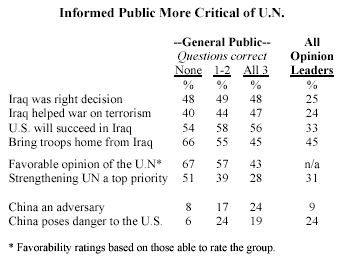 There is one aspect of Iraq policy where knowledgeable and less knowledgeable Americans disagree, and the knowledgeable share the view of opinion leaders. While two-thirds of low-knowledge Americans favor removing either some or all troops from Iraq now, just 45% of the knowledgeable agree — the same as the share of influentials overall who take this position.
There is one aspect of Iraq policy where knowledgeable and less knowledgeable Americans disagree, and the knowledgeable share the view of opinion leaders. While two-thirds of low-knowledge Americans favor removing either some or all troops from Iraq now, just 45% of the knowledgeable agree — the same as the share of influentials overall who take this position.
Despite their generally multilateral outlook, knowledgeable Americans are deeply skeptical of the United Nations. Most express an unfavorable view of the institution, and just 28% say strengthening the U.N. should be considered a top priority. By comparison, people with less knowledge of foreign affairs see the United Nations more favorably, and consider it a higher public policy priority.


